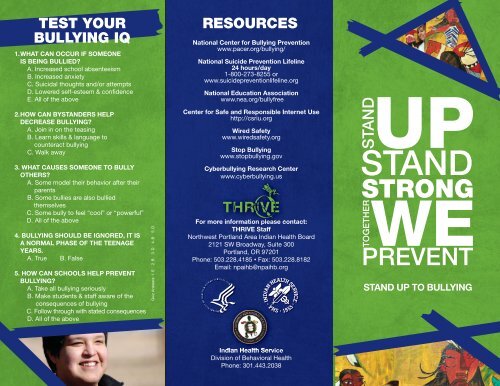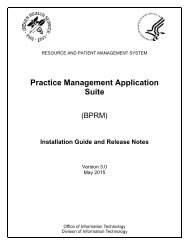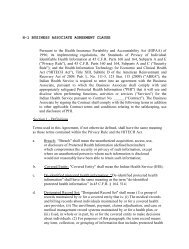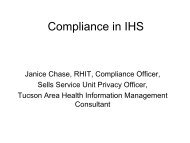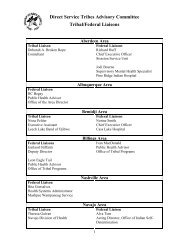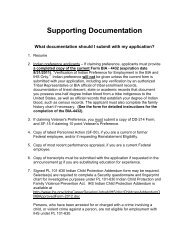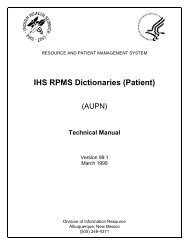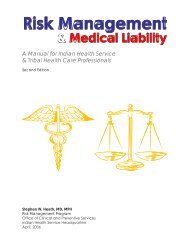Brochure about bullying - Indian Health Service
Brochure about bullying - Indian Health Service
Brochure about bullying - Indian Health Service
Create successful ePaper yourself
Turn your PDF publications into a flip-book with our unique Google optimized e-Paper software.
TEST YOUR<br />
BULLYING IQ<br />
1. WHAT CAN OCCUR IF SOMEONE<br />
IS BEING BULLIED?<br />
A. Increased school absenteeism<br />
B. Increased anxiety<br />
C. Suicidal thoughts and/or attempts<br />
D. Lowered self-esteem & confidence<br />
E. All of the above<br />
2. HOW CAN BYSTANDERS HELP<br />
DECREASE BULLYING?<br />
A. Join in on the teasing<br />
B. Learn skills & language to<br />
counteract <strong>bullying</strong><br />
C. Walk away<br />
3. WHAT CAUSES SOMEONE TO BULLY<br />
OTHERS?<br />
A. Some model their behavior after their<br />
parents<br />
B. Some bullies are also bullied<br />
themselves<br />
C. Some bully to feel “cool” or “powerful”<br />
D. All of the above<br />
4. BULLYING SHOULD BE IGNORED, IT IS<br />
A NORMAL PHASE OF THE TEENAGE<br />
YEARS.<br />
A. True B. False<br />
5. HOW CAN SCHOOLS HELP PREVENT<br />
BULLYING?<br />
A. Take all <strong>bullying</strong> seriously<br />
B. Make students & staff aware of the<br />
consequences of <strong>bullying</strong><br />
C. Follow through with stated consequences<br />
D. All of the above<br />
Quiz Answers: 1. E 2. B 3. D 4. B 5. D<br />
RESOURCES<br />
National Center for Bullying Prevention<br />
www.pacer.org/<strong>bullying</strong>/<br />
National Suicide Prevention Lifeline<br />
24 hours/day<br />
1-800-273-8255 or<br />
www.suicidepreventionlifeline.org<br />
National Education Association<br />
www.nea.org/bullyfree<br />
Center for Safe and Responsible Internet Use<br />
http://csriu.org<br />
Wired Safety<br />
www.wiredsafety.org<br />
Stop Bullying<br />
www.stop<strong>bullying</strong>.gov<br />
Cyber<strong>bullying</strong> Research Center<br />
www.cyber<strong>bullying</strong>.us<br />
For more information please contact:<br />
THRIVE Staff<br />
Northwest Portland Area <strong>Indian</strong> <strong>Health</strong> Board<br />
2121 SW Broadway, Suite 300<br />
Portland, OR 97201<br />
Phone: 503.228.4185 • Fax: 503.228.8182<br />
Email: npaihb@npaihb.org<br />
STAND UP TO BULLYING<br />
<strong>Indian</strong> <strong>Health</strong> <strong>Service</strong><br />
Division of Behavioral <strong>Health</strong><br />
Phone: 301.443.2038
DEFINITION OF<br />
BULLYING<br />
BULLYING: Bullying is when someone<br />
knowingly and repeatedly hurts a less<br />
powerful person. The harm to the recipient<br />
can be physical, emotional, or both.<br />
BULLY: The person causing deliberate harm to<br />
someone else.<br />
CYBERBULLYING: Deliberate repeated harm<br />
toward someone using an electronic device (like<br />
the Internet or a cell phone). This can include<br />
name calling, sending threatening messages,<br />
posting gossip, posting someone’s secrets,<br />
posting embarrassing photos, etc.<br />
STATISTICS<br />
In the U.S., 10% of students in 6th -10th grade<br />
report being bullied, and 13% report <strong>bullying</strong><br />
others. In nearly 2/3 of school shootings the<br />
attackers felt bullied by their classmates.<br />
Bullying contributes to 10% of the suicides<br />
completed in the U.S. The suicide rate for<br />
American <strong>Indian</strong>/Alaska Native 15-24 years-olds<br />
is twice that of their White counterparts.<br />
BULLYING AND<br />
SUICIDE<br />
If the victim of <strong>bullying</strong> feels like they have<br />
nobody to turn to to help stop the <strong>bullying</strong>, they<br />
may feel as though nobody cares, or that they<br />
do not deserve to be helped. The victim may<br />
view life as being hopeless, which can in turn<br />
lead to thoughts of suicide or even attempts.<br />
Bullying and victimization are frequently<br />
associated with thoughts of suicide or suicide<br />
attempts. Bullying can also cause or deepen<br />
depression, anxiety, poor self-esteem, feelings<br />
of being trapped, self-blame, insomnia, etc.<br />
INTERVENING<br />
AS AN ADULT<br />
Bullying is not inevitable. It can be stopped.<br />
It is important for everyone to STAND UP TO<br />
BULLYING.<br />
CONFRONT BULLIES: Let the teen know<br />
that their aggressive actions and behaviors are<br />
causing problems and are not okay. Discuss<br />
why the teen bullies and other ways to express<br />
negative feelings.<br />
PROVIDE TOOLS: Help the teen build other<br />
social skills and increase self-esteem. If the teen<br />
is “popular” discuss other ways to impress their<br />
peers. Talk with school staff <strong>about</strong> the situation<br />
and what changes can be made.<br />
BUILD PROTECTIONS: Protective factors,<br />
like having an adult teens can turn to or feeling<br />
personally connected to their culture, can<br />
protect teens from thoughts of suicide. Teach<br />
teens how to stand up to bullies, and to tell a<br />
trusted adult <strong>about</strong> any <strong>bullying</strong> they witness or<br />
experience.<br />
PARENTS PREVENT<br />
BULLYING<br />
KNOW THE WARNING SIGNS<br />
YOUR CHILD/TEEN(S): Regularly comes<br />
home with bruises & scrapes; is often upset<br />
after school, extracurricular activities, or being<br />
on the internet or getting texts; regularly asks<br />
to stay home from school or extracurricular<br />
activities; seems more anxious or depressed;<br />
experiences a drop in grades.<br />
STAND UP TO BULLYING<br />
POSITIVE ROLE-MODELING: Teens mimic<br />
how their parents treat others. If a parent bullies<br />
or is aggressive toward others, teens may<br />
model that behavior. Keep your cool and model<br />
good behavior.<br />
SET CONSEQUENCES: If negative patterns<br />
emerge, provide consequences immediately to<br />
show that <strong>bullying</strong> is not acceptable behavior.<br />
COMMUNICATE WITH THE SCHOOL: Know<br />
your school’s anti-<strong>bullying</strong> protocols and talk<br />
with school staff to be sure they will contact you<br />
if your teen is involved in <strong>bullying</strong> – either as the<br />
victim or the bully.<br />
TALK ABOUT BULLYING AS A PROBLEM:<br />
Discuss <strong>bullying</strong> with your teen. Make sure they<br />
know it is a serious problem and that it is not the<br />
victim’s fault. If you are open <strong>about</strong> your anti<strong>bullying</strong><br />
stance, they may be more willing to come<br />
to you if they witness or experience <strong>bullying</strong>.


